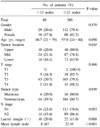Abstract
Purpose
Adequate lymph node analysis is critical for appropriate staging in colorectal cancer. The aim of this study is to determine whether 12 or more nodes recovered in stage III rectal cancer results in improved oncologic outcomes.
Methods
Two hundred and forty-eight patients with stage III rectal cancer from 1995 through 2004 were reviewed. They were categorized into 2 subgroups by the number of nodes retrieved (<12 and ≥12), and oncologic outcomes in terms of 5-year overall and disease-free survival were analyzed for all patients, patients with American Joint Committee on Cancer (AJCC) N1 disease (N=145), and those with AJCC N2 (N=103).
Results
Five-year overall and disease-free survival was 79.0% and 58.4%, respectively. There was no significant difference in clincopathologic features between <12 retrieval group and ≥12 group. Although there was significant difference in overall survival and disease-free survival between the number (<12 and ≥12) of lymph nodes removed in N2 disease (P=0.043; P=0.022) in univariate analysis, the total number of lymph nodes retrieved was not a prognostic factor affecting survival in multivariate analysis. The N2 stage and lateral margin involvement were prognostic factors affecting survival in multivariate analysis.
Figures and Tables
Fig. 1
(A) Kaplan-Meier disease-free survival according to the total number of lymph nodes retrieved. (B) Kaplan-Meier overall survival according to the total number of lymph nodes retrieved.

References
1. Greene FL, Stewart AK, Norton HJ. A new TNM staging strategy for node-positive (stage III) colon cancer: an analysis of 50,042 patients. Ann Surg. 2002. 236:416–421.
2. Compton CC, Greene FL. The staging of colorectal cancer: 2004 and beyond. CA Cancer J Clin. 2004. 54:295–308.
3. Sarli L, Bader G, Iusco D, Salvemini C, Mauro DD, Mazzeo A, et al. Number of lymph nodes examined and prognosis of TNM stage II colorectal cancer. Eur J Cancer. 2005. 41:272–279.
4. Joseph NE, Sigurdson ER, Hanlon AL, Wang H, Mayer RJ, MacDonald JS, et al. Accuracy of determining nodal negativity in colorectal cancer on the basis of the number of nodes retrieved on resection. Ann Surg Oncol. 2003. 10:213–218.
5. Law CH, Wright FC, Rapanos T, Alzahrani M, Hanna SS, Khalifa M, et al. Impact of lymph node retrieval and pathological ultra-staging on the prognosis of stage II colon cancer. J Surg Oncol. 2003. 84:120–126.
6. Jestin P, Pahlman L, Glimelius B, Gunnarsson U. Cancer staging and survival in colon cancer is dependent on the quality of the pathologists' specimen examination. Eur J Cancer. 2005. 41:2071–2078.
7. Johnson PM, Porter GA, Ricciardi R, Baxter NN. Increasing negative lymph node count is independently associated with improved long-term survival in stage IIIB and IIIC colon cancer. J Clin Oncol. 2006. 24:3570–3575.
8. Le Voyer TE, Sigurdson ER, Hanlon AL, Mayer RJ, Macdonald JS, Catalano PJ, et al. Colon cancer survival is associated with increasing number of lymph nodes analyzed: a secondary survey of intergroup trial INT-0089. J Clin Oncol. 2003. 21:2912–2919.
9. Chang GJ, Rodriguez-Bigas MA, Skibber JM, Moyer VA. Lymph node evaluation and survival after curative resection of colon cancer: systematic review. J Natl Cancer Inst. 2007. 99:433–441.
10. Tepper JE, O'Connell MJ, Niedzwiecki D, Hollis D, Compton C, Benson AB 3rd, et al. Impact of number of nodes retrieved on outcome in patients with rectal cancer. J Clin Oncol. 2001. 19:157–163.
11. Pocard M, Panis Y, Malassagne B, Nemeth J, Hautefeuille P, Valleur P. Assessing the effectiveness of mesorectal excision in rectal cancer: prognostic value of the number of lymph nodes found in resected specimens. Dis Colon Rectum. 1998. 41:839–845.
12. Compton CC. Updated protocol for the examination of specimens from patients with carcinomas of the colon and rectum, excluding carcinoid tumors, lymphomas, sarcomas, and tumors of the vermiform appendix: a basis for checklists. Cancer Committee. Arch Pathol Lab Med. 2000. 124:1016–1025.
13. Prandi M, Lionetto R, Bini A, Francioni G, Accarpio G, Anfossi A, et al. Prognostic evaluation of stage B colon cancer patients is improved by an adequate lymphadenectomy: results of a secondary analysis of a large scale adjuvant trial. Ann Surg. 2002. 235:458–463.
14. Pirro N, Pignodel C, Cathala P, Fabbro-Peray P, Godlewski G, Prudhomme M. The number of lymph nodes is correlated with mesorectal morphometry. Surg Radiol Anat. 2008. 30:297–302.
15. Topor B, Acland R, Kolodko V, Galandiuk S. Mesorectal lymph nodes: their location and distribution within the mesorectum. Dis Colon Rectum. 2003. 46:779–785.
16. Morris EJ, Maughan NJ, Forman D, Quirke P. Identifying stage III colorectal cancer patients: the influence of the patient, surgeon, and pathologist. J Clin Oncol. 2007. 25:2573–2579.
17. Heald RJ, Moran BJ, Ryall RD, Sexton R, MacFarlane JK. Rectal cancer: the Basingstoke experience of total mesorectal excision, 1978~1997. Arch Surg. 1998. 133:894–899.
18. Arbman G, Nilsson E, Hallbook O, Sjodahl R. Local recurrence following total mesorectal excision for rectal cancer. Br J Surg. 1996. 83:375–379.
19. Enker WE, Havenga K, Polyak T, Thaler H, Cranor M. Abdominoperineal resection via total mesorectal excision and autonomic nerve preservation for low rectal cancer. World J Surg. 1997. 21:715–720.
20. Wang J, Kulaylat M, Rockette H, Hassett J, Rajput A, Dunn KB, et al. Should total number of lymph nodes be used as a quality of care measure for stage III colon cancer? Ann Surg. 2009. 249:559–563.
21. Feinstein AR, Sosin DM, Wells CK. The Will Rogers phenomenon. Stage migration and new diagnostic techniques as a source of misleading statistics for survival in cancer. N Engl J Med. 1985. 312:1604–1608.




 PDF
PDF ePub
ePub Citation
Citation Print
Print






 XML Download
XML Download